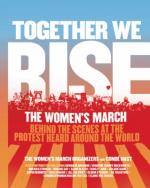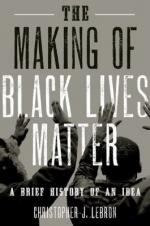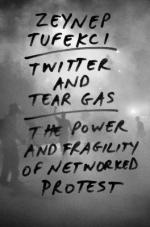April 3, 2018 | sobczakd
In the year since the Women's March on Washington (and simultaneous marches around the globe), the organizers of the historic event have come together to share their experiences and the lessons they've learned in the time since Donald Trump's inauguration. This book is a collection of photos and oral histories that expertly blends the larger-than-life power of the movement and small-scale moments shared among the women in charge. The contributors reveal what it was like to be parents, lovers, and daughters during this charged time and graciously admit to the fear and skepticism many felt before the march. The book gives readers a picture of the diverse organizers behind the movement, reminding all that this event would not have been so successful without extreme intersectionality. Interspersed between the organizers' narratives are accounts of the day from women all over the world, explaining how that show of dissent impacted their lives, and notes from celebrities like America Ferrera, Roxane Gay, and Jill Solloway detailing their own views of the march. Large and plentiful photos show many shades of hope and inclusion in this energizing and emotional trip through the movement.
Started in the wake of George Zimmerman's 2013 acquittal in the death of Trayvon Martin, the #BlackLivesMatter movement has become a powerful and uncompromising campaign demanding redress for the brutal and unjustified treatment of black bodies by law enforcement in the United States. The movement is only a few years old, but as Christopher J. Lebron argues in this book, the sentiment behind it is not; the plea and demand that "Black Lives Matter" comes out of a much older and richer tradition arguing for the equal dignity--and not just equal rights--of black people. The Making of Black Lives Matter presents a condensed and accessible intellectual history that traces the genesis of the ideas that have built into the #BlackLivesMatter movement. Drawing on the work of revolutionary black public intellectuals, including Frederick Douglass, Ida B. Wells, Langston Hughes, Zora Neal Hurston, Anna Julia Cooper, Audre Lorde, James Baldwin, and Martin Luther King, Jr., Lebron clarifies what it means to assert that "Black Lives Matter" when faced with contemporary instances of anti-black law enforcement. He also illuminates the crucial difference between the problem signaled by the social media hashtag and how we think that we ought to address the problem. As Lebron states, police body cameras, or even the exhortation for civil rights mean nothing in the absence of equality and dignity. To upset dominant practices of abuse, oppression and disregard, we must reach instead for radical sensibility. Radical sensibility requires that we become cognizant of the history of black thought and activism in order to make sense of the emotions, demands, and argument of present-day activists and public thinkers. Only in this way can we truly embrace and pursue the idea of racial progress in America.
A firsthand account and incisive analysis of modern protest, revealing internet-fueled social movements' greatest strengths and frequent challenges To understand a thwarted Turkish coup, an anti-Wall Street encampment, and a packed Tahrir Square, we must first comprehend the power and the weaknesses of using new technologies to mobilize large numbers of people. Tufekci explains the nuanced trajectories of modern protests-how they form, how they operate differently from past protests, and why they have difficulty persisting in their long-term quests for change. Tufekci speaks from direct experience, combining on-the-ground interviews with insightful analysis. She describes how the internet helped the Zapatista uprisings in Mexico, the necessity of remote Twitter users to organize medical supplies during Arab Spring, the refusal to use bullhorns in the Occupy Movement that started in New York, and the empowering effect of tear gas in Istanbul's Gezi Park. These details from life inside social movements complete a moving investigation of authority, technology, and culture-and offer essential insights into the future of governance.
At one time ranked fourth in the world, professional tennis star James Blake overcame tremendous obstacles (fractured neck, rare virus, the death of his father), all of which were chronicled in his 2007 memoir, Breaking Back. Then, in a 2015 case of mistaken identity, African American Blake was tackled by an abusive police officer, making headlines and national news. Blake's new book offers examples of the power of sports to unify as well as providing a playbook on sports activism for athletes who want to use their brand to effect change. The text includes interviews with tennis icon Billie Jean King, football's Colin Kaepernick, and Boston Marathon champion Meb Keflezighi. One especially noteworthy section provides historical context for the controversial 2002 Wimbledon doubles team of Aisam Ul-Haq Qureshi (Pakistani Muslim) and Amir Hadad (Israeli Jew). In the spirit of the late tennis star and social activist Arthur Ashe, Blake is using his platform to educate, inspire positive change, and support athletes who are committed to acting on their views and attempting to make a difference.
Same-sex marriage, #BlackLivesMatter, the Dream Act, the People's Climate March, End the New Jim Crow, Occupy Wall Street-these are just a few of the initiatives that have taken flight in the past decade, the most fertile and productive era of activism and reform this country has seen since the 1960s. Now, in a visually rich and deeply inspiring book, movement leaders and activists distill their wisdom, sharing lessons of what works and what hinders transformative social change. Weaving together interviews with today's most successful activists-from Bill McKibben and Clayton Thomas Muller to Karen Lewis, Rinku Sen, Ai-jen Poo, Favianna Rodriguez, Rea Carey, Gaby Pacheco, Patrice Collins, and more with narrative recountings of strategies and campaigns alongside full-color photos and an afterword by Antonia Darder, social activist Greg Jobin-Leeds joins forces with AgitArte, an organization of artists and organizers, to document the stories, philosophy, tactics, and art of today's leading social change movements. Beautifully packaged in a wonderfully affordable paperback edition, When We Fight, We Win! will allow a whole generation of readers to celebrate and benefit from a remarkable decade of activism and reform.
Khan-Cullors, a self-described artist, organizer, freedom fighter as well as a Fulbright scholar and recipient of the Sidney Peace Prize, recounts, with coauthor bandele, her personal experiences and those as a founder of the Black Lives Matter Movement. Khan-Cullors delineates the harsh realities she faced growing up in Los Angeles in the late 1990s and early 2000s, from her mother working three jobs and still not able to earn a living wage to the grievous harm the war on drugs did to so many young black men, including her relatives and friends. She focuses on her fight to support one of her brothers, who showed signs of mental illness and received no professional help until after he endured multiple school suspensions, criminal arrests, and police torture. Khan-Cullors credits her success to the education she received in charter arts schools and with community activist groups. She then chronicles how she, Alicia Garza, and Opal Tomrti use social media, the arts, and civil activism to respond to the killings of two young black men, Trayvon Martin and Michael Brown, and how that led to the founding of Black Lives Matter. With great candor about her complex personal life, Khan-Cullors has created a memoir as compelling as a page-turning novel. HIGH-DEMAND BACKSTORY: This topical and unique look inside the Black Lives Matter movement.
Twenty-three influential and eloquent feminist writers of the twenty-first century have come together to create this searing and urgent collection. Contributors including Rebecca Solnit (The Mother of All Questions, 2017), Samantha Irby (We Are Never Meeting in Real Life, 2017), Cheryl Strayed (Wild, 2012), and Jessica Valenti (Sex Object, 2016) present vulnerable, furious, and frank accounts of their lives since Donald Trump's election to the White House. Editors Mukhopadhyay and Harding have assembled an impressive breadth of perspectives, giving voice to the transgender and queer communities, women living with visible and invisible disabilities, the Black Lives Matter movement, the overlooked resilience of black women, the Asian American experience, the skyrocketing patterns of violence against Native women and children, the labor movement, and countless others that are all too often left out of U.S. political consciousness. The writers are emotionally generous as they meditate on this pivotal moment in American history. The 2016 election marked a deeply personal shift in the tides of hope for so many. This book invites readers to converse, comfort, and hold one another accountable in the hope of igniting radical, intersectional change.
There are numerous books about crafting for causes, but none has explored the intersection of craft and altruism with the level of detail found here. Tapper (Shear Spirit: Ten Fiber Farms, Twenty Patterns, and Miles of Yarn), inspired by a yarn graffiti installation in Washington state, explores the motivations of creative people who use their skills to make public statements about everything from the environment to the role of traditional "women's work" in contemporary society. There are a few familiar figures, such as Jenny Hart of the Sublime Stitching company, but most will be new to readers. The profiles and the projects that follow them are diverse, and readers are bound to find inspiration in this nicely curated volume.
Craftivism is a term that Greer (Knitting for Good!) coined to describe the intersection of handmade items and political activism. The current craft/DIY renaissance has its roots in contemporary feminism and the reclaiming of "women's work," and Greer explores this idea in detail through essays by and interviews with activists who have combined their passion for craft with their political ideals. "Craft" is defined broadly and the examples presented range from fine-art style work, such as Inga Hamilton's environmental sculpture and Carrie -Reichardt's giant-size political mosaics to Kim Werker's intentionally ugly handicrafts and Maria Molteni's NCAA Net Works, which places handmade nets on basketball hoops in public places. Greer includes activists from a variety of cultures and countries and there's a wide range of statements on topics such as urban blight, the environmental impact of automobile traffic in Brazil, and women's health. Each segment is accompanied by a variety of colored photographs showing the craftivist's work in context.








